
During his lifetime, English singer-songwriter David Bowie (1947–2016) released 26 studio albums, nine live albums, two soundtrack albums, 26 compilation albums, eight extended plays, 128 singles and six box sets. Since his death, one further studio album, 13 live albums, one soundtrack album, one compilation album, four extended plays and six box sets have been released. Bowie also released 28 video albums and 72 music videos. Throughout his lifetime, Bowie sold at least 100 million records worldwide. In 2012, Bowie was ranked ninth best selling singles artist in United Kingdom with 10.6 million singles sold. As of January 2016, 12.09 million Bowie singles had been sold in Britain. In a period of 24 months since his death, five million records were sold in UK, 3.1 million singles and two million albums.

Let's Dance is the 15th studio album by the English singer-songwriter David Bowie, released on 14 April 1983 through EMI America Records. Co-produced by Bowie and Nile Rodgers, the album was recorded in December 1982 at the Power Station in New York City. The sessions featured players from Rodgers' band Chic and the then-unknown Texas blues guitarist Stevie Ray Vaughan on lead guitar. For the first time ever, Bowie only sang and played no instruments.
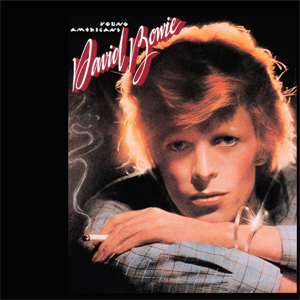
Young Americans is the ninth studio album by the English musician David Bowie, released on 7 March 1975 through RCA Records. A departure from the glam rock style of previous albums, the record showcased Bowie's interest in soul and R&B. Music critics have described the sound as blue-eyed soul; Bowie himself labelled the album's sound "plastic soul".
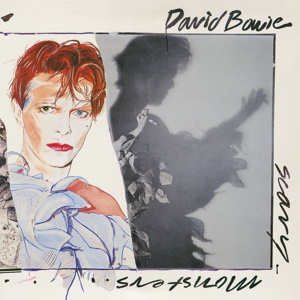
Scary Monsters (and Super Creeps), also known simply as Scary Monsters, is the 14th studio album by the English musician David Bowie, released on 12 September 1980 through RCA Records. His first album following the Berlin Trilogy (Low, "Heroes" and Lodger), Scary Monsters was Bowie's attempt to create a more commercial record after the trilogy proved successful artistically but less so commercially.

"Blue Jean" is a song written and recorded by the English singer-songwriter David Bowie for his sixteenth studio album Tonight (1984). One of only two tracks on the album to be written entirely by Bowie, it was released as a single ahead of the album and charted in the United States, peaking at No. 8, becoming his 5th and last top 10 hit with no features. The song is loosely inspired by Eddie Cochran.

Tonight is the 16th studio album by the English singer-songwriter David Bowie, released on 24 September 1984 through EMI America Records. The follow-up to his most commercially successful album Let's Dance, it was written and recorded in mid-1984 at Le Studio in Morin-Heights, Canada, following the conclusion of the Serious Moonlight Tour. Bowie, Derek Bramble and Hugh Padgham co-produced the album. Many of the same personnel from Let's Dance and the accompanying tour returned for Tonight, with a few additions. Much of Bowie's creative process was the same as he used on Let's Dance, similarly playing no instruments and offering little creative input to the musicians.
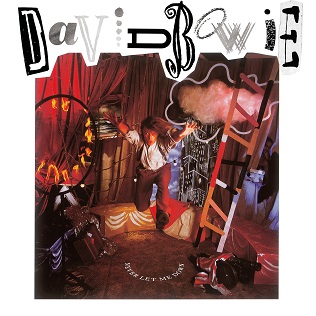
Never Let Me Down is the 17th studio album by the English musician David Bowie, released on 21 April 1987 through EMI America Records. Co-produced by Bowie and David Richards and featuring guitarist Peter Frampton, the album was recorded in Switzerland and New York City from September to November 1986. Bowie's goal for the project was to record it differently following his disappointment with 1984's Tonight. Musically, Never Let Me Down has been characterised as pop rock, art rock and hard rock; Bowie himself considered the record a return to rock and roll music. The cover artwork features Bowie surrounded by numerous elements from the songs.

"Fame" is a song recorded by the English singer-songwriter David Bowie. It was released on his 1975 album Young Americans and was later issued as the album's second single by RCA Records in June 1975. Written by Bowie, Carlos Alomar and John Lennon, it was recorded at Electric Lady Studios in New York City in January 1975. It is a funk rock song that represents Bowie's dissatisfaction with the troubles of fame and stardom.
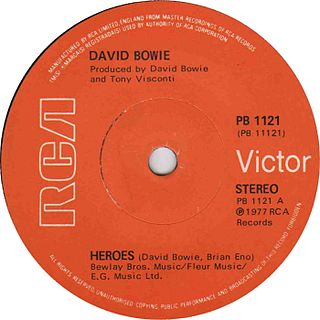
"'Heroes'" is a song by the English musician David Bowie from his 12th studio album of the same name. Co-written by Bowie and Brian Eno and co-produced by Bowie and Tony Visconti, the song was recorded in mid-1977 at Hansa Studio 2 in West Berlin. The backing track was recorded fully before lyrics were written; Bowie and Eno added synthesiser overdubs while Robert Fripp contributed guitar. To record the vocal, Visconti devised a "multi-latch" system, wherein three microphones were placed at different distances from Bowie and would open when he sang loud enough. Like other album tracks, he improvised lyrics while standing at the microphone.

"Cat People (Putting Out Fire)" is a song recorded by the English singer-songwriter David Bowie as the title track of the 1982 erotic horror film Cat People. Bowie became involved with the track after director Paul Schrader reached out to him about collaborating. The song was recorded at Mountain Studios in Montreux, Switzerland in July 1981. Bowie wrote the lyrics, which reflected the film, while the Italian producer Giorgio Moroder composed the music, which is built around only two chord changes.

"Let's Dance" is a song by the English singer-songwriter David Bowie, originally included as the title track of his 1983 album of the same name. Co-produced by Nile Rodgers of Chic, it was recorded in late 1982 at the Power Station in New York City. With the assistance of engineer Bob Clearmountain, Rodgers transformed the song from its folk rock origins to a dance number through studio effects and new musicians Bowie had yet to work with. Bowie hired then-unknown Texas guitarist Stevie Ray Vaughan, who added a blues-edge.
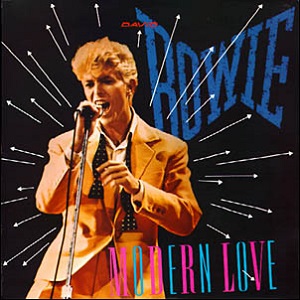
"Modern Love" is a song written by the English singer-songwriter David Bowie. It was released as the opening track on his 1983 album Let's Dance and issued as the third single from the album later in the year. Co-produced by Bowie and Nile Rodgers of the American band Chic, it is a rock song that contains elements of new wave music. It was recorded at the Power Station in Manhattan and was one of the first tracks recorded for the album. It was performed by Bowie on the Serious Moonlight Tour, where it often closed the shows. A music video for the song, directed by Jim Yukich and featuring a performance of the song during the tour, was released in 1983 and played frequently on MTV.

"When the Wind Blows" is a 1986 song from the soundtrack of the film of the same name, performed by David Bowie and written by Bowie and Erdal Kızılçay. It was released as a single in October 1986 and released digitally in 2007.
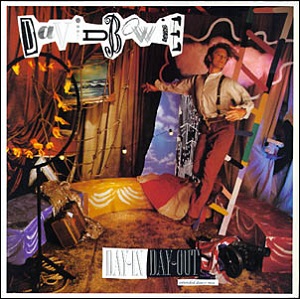
"Day-In Day-Out" is a song recorded by the English singer David Bowie, serving as the opening track for his seventeenth studio album, Never Let Me Down (1987). It was issued as a single on 23 March 1987 ahead of the record's release. The recording was solely written by Bowie, while production was handled by him along with David Richards. An R&B track, "Day-In Day-Out" criticizes the treatment of the homeless in the United States at that time, and deals with the depths to which a young mother sinks to feed her child.

"Time Will Crawl" is a song recorded by the English singer David Bowie, serving as the second single for his seventeenth album, Never Let Me Down (1987). It was written by Bowie and produced by him and David Richards. Released in 1987 by EMI, the recording addresses the destruction of the planet by pollution and industry; the Chernobyl disaster was a direct influence on the lyrics. The accompanying video served as a teaser to Bowie's Glass Spider Tour (1987). Music critics reviewed "Time Will Crawl" positively, commending its lyrics and production, and describing it one of Bowie's best efforts of the mid– to late–1980s. Additionally, Bowie later called the song one of his favorites from his entire career. Commercially, the single peaked at number 33 on the UK Singles Chart and at number seven on Billboard's Mainstream Rock Tracks chart.

Labyrinth is a soundtrack album by David Bowie and composer Trevor Jones, released in 1986 for the film Labyrinth. It was the second of three soundtrack releases in which Bowie had a major role, following Christiane F. (1981) and preceding The Buddha of Suburbia (1993). The soundtrack album features Jones' score, which is split into six tracks for the soundtrack: "Into the Labyrinth", "Sarah", "Hallucination", "The Goblin Battle", "Thirteen O'Clock", and "Home at Last".

Glass Spider is a concert film by English singer David Bowie. The release was sourced from eight shows during the first two weeks of November 1987 at the Sydney Entertainment Centre in Australia during the last month of the Glass Spider Tour. The 86-show tour, which also visited Europe, North America and New Zealand, was in support of Bowie's album Never Let Me Down (1987). Originally released in 1988 on VHS, the tour was choreographed by Toni Basil, directed by David Mallet, and produced by Anthony Eaton. The VHS was released by MPI Home Video in the US and by Video Collection International in the UK.

Bowie – The Video Collection is a video album by David Bowie, released in 1993. It included most official music videos made by Bowie between 1972 and 1990.
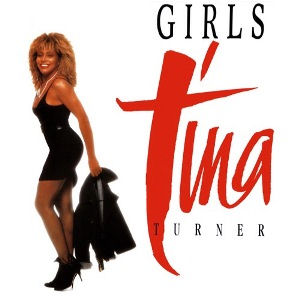
"Girls" is a song written by David Bowie and originally recorded by Tina Turner for her 1986 album Break Every Rule. It was released as a single the same year, where it became a top 20 hit in the Netherlands. Bowie recorded his own studio version of the track during his 1987 Never Let Me Down recording sessions, and released the track as the B-side to his 1987 single "Time Will Crawl".




















